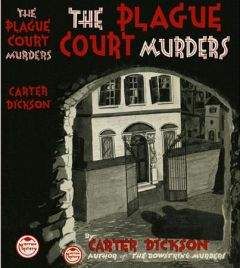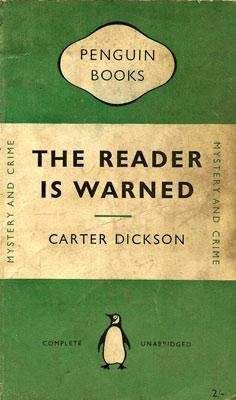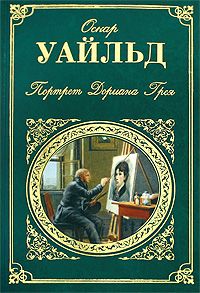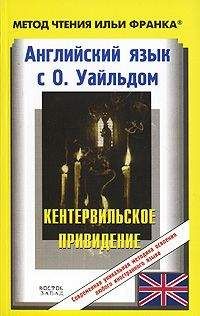Nowadays the sound of a bicycle-bell is associated in my mind with that small house - like all its neighbors, with solid gable and red-and-white glass door, except that it was detached in its own grounds - before which our car presently drew up. The pallor of a street-lamp, blurred with mist, showed us the crowd that had gathered before the wall round Magnolia Cottage. It was a tractable crowd. Its members said nothing and did nothing; they shifted and stared thoughtfully at the pavement, as though they were philosophizing about death. Some bicycle-bells rang insistently beyond them; otherwise the broad dark road was quiet. Frequently a policeman would tower through the crowd, saying, "Now, then; now, then!" with absentminded briskness; the crowd would shift round slightly, and stay the same.
Sighting our car, the policeman made a lane for us. Somebody whispered, "'Oo's the old josser?" In ceremonial quiet the policeman opened an iron gate; we went up a brick path, followed by more whisperings. A stout, nervous-looking young man with a ruddy face - obviously not used to plain clothes - opened the front door and saluted Masters.
"Right, Banks," said the Inspector curtly. "Anything new since you rang up?"
"The old lady's come back, sir," replied Banks. He wiped his forehead rather doubtfully. "Mrs. Sweeney. Bit of a handful. I've got her in the parlor.... That corpse's still in the cellar, sir; we had to take it out of the furnace. And the knife's still in its back, though the rest is a mess. It's that - that Plague Court knife right enough."
He led us into a dismal hallway, which smelt strongly of yesterday's cooked mutton. Another smell had got into it, too; but I will not suggest an analogy. A tipsy gas-mantle burned on a bracket near the staircase; there was cracked oil-cloth on the floor and the flowered-paper walls had a tendency to sweat. I noticed several closed doors, before which hung bead curtains. Masters asked for the man who had discovered the body; and became sarcastic when informed that the man had been allowed to go home for a time.
"His 'ands were burned bad, sir," Banks replied, rather stiffly. "He did a man's job, and that's a fact. I got one or two burns meself. And he's straight. I’ve got it from everybody: they all know him. 'E lives just round the next turning; lived there all his life."
Masters grunted. "Right. Find out anything new?"
"Not much time, sir. If you'd like to look at that corp--?"
The Inspector glanced at H.M., who was glumly peering round the hall.
"Me? Oh, no. You go look at it Masters. I got other business. I'm goin' out and talk to that bunch of people on the pavement. Why do you police fellers always want to chase crowds away? They come right up to you, better than if you'd rounded up the whole neighborhood on purpose-which you couldn't do if you wanted-and yet you don't use 'em. Then I'm goin' to look in the yard. See you later."
He sniffed absently, and tottered out. A moment later we heard him saying, "Howdy, boys?" to the obvious stupefaction of the crowd.
Banks took us first to a little dining-room, where everything had that sickly and fish-glazed look of the stuffed trout in a case over the mantelpiece. A decanter of port had been set out on the blotched table-cloth, but only one glass had been used. Opposite it - obviously where Joseph had sat - was a five-pound box of chocolates from which the whole top layer had been greedily eaten. It was that which intensified the evil of the business: Joseph greedily eating chocolates probably brought him by somebody; and across from him, X sipping port and watching.... Masters sniffed the air.
"This the room where you saw the light first, Banks?" he asked. "Right. There's something I can smell"
"Chloroform, sir. We found the sponge downstairs" Again Banks nervously wiped his forehead with the back of his hand. "Whoever it was got behind him, slipped the sponge on; then dragged him downstairs and killed him easy. No blood up here.... I don't think we were expected to find the body, sir. I think whoever it was intended for him just to disappear, shoved in the furnace and gone. But John Watkins happened to see it, and - and whoever it was just cut and ran."
"Maybe. Downstairs now."
We did not linger in the basement. In fact, I came up after one look. The place was splashed with water from their attempts to put out the fire; the furnace still sizzled, winking with angry red gleams, and harsh smoke hung in sheets along the floor. One candle was burning on a box: lying near it was something which at first glance looked as though it had rotted and blackened, now crumbling to pieces with little curls of sparks winking along it. You could not make out much except the legs, whose shoes were only badly scorched; but you could see the handle of the dagger in the back. One fragment of Joseph's gayly checkered clothes hung singeing still on the open furnace door. It was not alone the odor, acrid smoke or human; the sight itself turned my stomach, and I had to get back up to the comparative cleanness of the mutton-greasy air in the hall.
As I did so, one of the doors moved quickly shut again, as though someone had been peering out; and that set the last touch on it. Banks had said Mrs. Sweeney was in one of the rooms; but always the slyness! Always the voice, the soft footfall, the glutinous something just round the corner, never seen until it leaped and struck! What, for instance, had Joseph thought (munching his chocolates under the singing gas-light, in a prosaic dining-room) when somebody smiling at him from the other side of the table had got up, strolled round him, and-?
Masters' footfalls clumped up the stairs. Banks was repeating his story; but there seemed to be nothing new. The Inspector made a few notes, after which we went in to see Mrs. Sweeney.
Mrs. Sweeney was a large woman, with a heavy face which seemed to come sailing at us as she got up from her seat by the small round table in this waxy best-parlor. She was not ill-featured; she resembled one of those old ladies who sit and knit in boarding-houses, but larger, harder, and more archly cunning. Her grayish hair was folded into buns over her ears. She wore the black coat "with black feathers"; and a rimless pince-nez attached by a gold chain. This last she twitched off with a gesture which tried to indicate that she had been improving her time by studying the Bible, on the center-table.
"So!" said Mrs. Sweeney. Her dark eyebrows went up. She lifted the pince-nez slightly to one side of her eyes, as though she had been removing a mask, and rasped accusingly: "I suppose you know, my friend, the horror and the awfulness of what has been done in this house?"
"Yes, we know it," replied Masters, wearily, in the tone of one who says, "Chuck it!" He got out his notebook. "Your name, please."
"Melantha Sweeney."
"Occupation?"
"I am an independent widow." She gave a shake of her ample bust, rather as though she were dislodging worldly cares; but it was a gesture curiously like that performed by the chorus in a musical comedy.
"Just so. Any relation to the deceased, Joseph Dennis?"
"No. That is what I wished to explain. I was very fond of poor Joseph, though he resisted all my attempts to know him better. I have been fond of him ever since Mr. Darworth, the gentleman who was the victim of that brutal assault last night, brought him to me and provided a home for him. The boy had genuine - truly genuine - psychic talents," said Mrs. Sweeney, knocking her knuckles on the Bible.
"How long have you lived here?"
"Over four years."
"How long has Joseph Dennis lived here?"
"I believe-I believe it will be three years this quarter-day.... I am very worldly-minded, you see." She was trying to strike a note of lightness, for a reason I could not understand. Then she turned a little sideways, and the gaslight showed sweat on her forehead; it brought out suddenly the fact that this woman was nearly frightened out of her wits. We heard her breathing.
"How well did you know Mr. Darworth?"
"Not at all well! I - I used to be interested in psychical research; that was how I met him. But I gave it up. It was much too fatiguing."
These, I could tell, were merely quick routine questions; Masters was not attacking. The real test would come after all evidence had been straightened. He went on:
"Do you know anything about Joseph Dennis? His parents, say?"
"I know absolutely nothing" She added, with a curious inflection: "You would have to ask Mr. Darworth about his parents."
"Come, come!"
"That is all I can tell you. He was a foundling, who had been starved and ill-treated in childhood, I believe."
"Did you have any reason to suspect that he was in danger?"
"No! He - he was upset when he returned last night; naturally. But he had forgotten about it this morning. I gathered they did not tell him Mr. Darworth was dead, and he was eager to go to the cinema this afternoon.... I-I suppose he did. I myself left the house at eleven o'clock this morning. . . ."
Mrs. Sweeney faltered. She grasped the edges of the Bible, and began to speak earnestly, partly incoherently. "Listen to me. Please listen. You want to know what I know about this ghastly business this afternoon. And I tell you I can account for every minute I've spent today, after I left here this morning. I went round to see John Watkins, the odd-job man; there is a filled-in well in the back garden that has been cracking its cement and flooding out, and I wanted it repaired. Afterwards I went straight to the home of some friends of mine in Clapham, and stayed there all day. . . ."
She looked from Masters to me, and then at Banks. Yet, despite all this, the woman's main motive was not fear lest she would be suspected; this did not worry her nearly so much as something else. And there was also something about her that did not quite ring true. An overdone gesture, a trick of speech; what was it?
"What time did you return?"
"I took a bus from Clapham - it must have been shortly after six o'clock. You know what I found. Your-your man will tell you when I arrived." She backed away, and sat down in a horsehair chair behind the table. Taking out a small handkerchief, she dabbed at her face as though she were putting on powder. "Inspector - you are an inspector, aren't you?" she corrected herself hastily. "Yes. There's one other thing. In heaven's name, you won't force me to stay the night here, will you? I beg you, I pray . . .!" Even to her this seemed to sound a trifle flowery. She went on in an even but a very vehement tone: "You may investigate these friends of mine. They are good, respectable people. Won't you allow me to spend the night with them?"
"Well, well ... why do you want to do that?" Mrs. Sweeney looked straight at him. "I'm afraid," she said.
Masters shut up his notebook. He said to Banks, "See if you can find Sir Henry: the man who came with us. I want him to speak to this witness. . . . Wait! Have you searched the house, upstairs and all about?"
This question was directed at Mrs. Sweeney; I saw her give a slight movement, which she disguised by industrious work with the handkerchief.
"Been a lot of ransacking upstairs, sir. I don't know. The lady here'll have to tell if anything's missing."
I went with Banks out into the hall. Some instinct had begun to warn all of us that this house, and Mrs. Sweeney, might be of more significance in the case than anybody had suspected. There was something wrong about Mrs. Sweeney which did not rest alone in mere lies. She was acting; and, either in fear or guilt or only in nervousness, was overplaying the part. I wanted to see H.M. in action with this witness.
He was not at the gate outside, and the crowd had thinned. But the policeman on duty, who was imbued with a Jovian amusement, informed us. H.M. was over at the King William, standing drinks to half the population. Banks went back to tell Masters, whom I could hear cursing in the doorway, while I went out in search of him. I believe the good Inspector was also shaking his fist.
The King William IV, a snug public-house exhaling a mist of tobacco-smoke through its lighted doors, was crowded. The chairs along the walls were occupied by the usual red-faced gentlemen with brass-collar-studs, who sit in a line like figures in a shooting-gallery and chuckle at everything. H.M., with a pint tankard in his hand and an admiring crowd about him, was throwing darts at a scarred board. In the intervals he was saying, "Gentlemen, we must not, we will not, as free British subjects, submit to the indignities perpetrated by the present Government in grindin' the faces of the working-" I stuck my head through the doorway of, the bar-parlor and whistled. He stopped, disposed of the pint of bitter with a shark-like gulp, shook hands with everybody, and lumbered out pursued by cheers.
In the misty street outside his expression changed. He turned up the collar of his coat; and, if I had not known him so well, I could have sworn the man was nervous.
I said: "The old tricks are still successful. Did you learn anything?"
He growled something that sounded like an affirmative.
He stumped on a few paces, blew his nose violently on a handkerchief, and said: "Yes. About Darworth, and - other things too. Humph. Get the old residents if you want information, son. Stick to the pubs. There's been a woman seen visitin' that house from time to time....
"Ei, why didn't I guess it? I started to suspect it while we were at Darworth's house, but I don't mind tellin' you that I've very nearly made the biggest mistake of my life. ... Well. 'Tisn't irreparable; that's a consolation. If luck's with me, tomorrow night-maybe later, but I hope tomorrow night-I can introduce you to the coolest and quickest. thinking criminal devil that...”
"A woman?"
"I didn't say that, Shut up, now. Somebody knows more about that house than we do. Darworth was murdered partly because of it. Joseph was murdered to get him out of the way. And now...."
He had stopped on the pavement across the street from Magnolia Cottage. It looked bleak and sinister, with the constable pacing under the street-lamp, the sagging iron gate and the glimpse of a weedy brick walk. H.M. pointed.
"Darworth owned that house," he said casually.
"Then-?"
"Before the Sweeney woman took it, it stood vacant for I dunno how many years; no notice-board up; nobody could buy. But the old gossip-hands remember somebody of Darworth's description that used to come there. If it hadn't been for a peculiar bone-structure, that could be identified as long as eternity if the body ever got dug up; so Horseface says.... Son, I shouldn't be at all surprised if that's not where Elsie Fenwick is buried."
Round the corner of Hather Street whirled the lights of a police-car, its siren crying ahead. On a common impulse H.M. and I started across the road. We came up just as the car scraped in at the curb and three men in plain clothes got out. Masters, hurrying down the brick walk, held open the gate for them. One of the newcomers said, "Inspector Masters, sir!" and there was urgency in his voice.
"Well?"
"They said you'd probably be here, but there isn't a telephone here and we couldn't reach you. You're wanted back at the Yard...”
Masters' hands closed on the spikes of the gate. He seemed to have frozen there, and it was several seconds before he got out:




